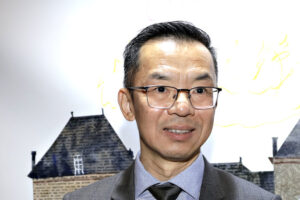MPs demand sanction of Chinese ambassador over comments about ex-Soviet states

Save articles for later
Add articles to your saved list and come back to them any time.
London: More than 70 MPs representing the UK and Europe have written to the French government demanding the Chinese ambassador in Paris be declared persona non grata, after he told local television that ex-Soviet states have no effective status as sovereign countries.
Ambassador Lu Shaye’s comments on France’s free-to-air television La Chaîne Info provoked outrage and brought into question Beijing’s attempts to broker peace between Russia and Ukraine.
Lu Shaye, Chinese ambassador to France, has provoked a furious response to his comments about the independence of ex-Soviet states.Credit: Getty
Beijing’s envoy to France had been asked about the status of Crimea, which Russia’s Vladimir Putin annexed in 2014, and responded that it depends as Crimea was “first Russian”. Lu then went on to generally question the status of post-Soviet states.
“These ex-USSR countries don’t have actual status in international law because there is no international agreement to materialise their sovereign status,” Lu said.
The ambassador’s comments follow French President Emmanuel Macron’s three-day state visit to Beijing, after which he urged Europe to achieve “strategic autonomy” from the United States and said the continent should avoid becoming involved in any conflict between the two superpowers over Taiwan, which China has threatened to invade by force.
The Inter-Parliamentary Alliance on China, (IPAC) a cross-party grouping that represents MPs in more than 30 legislatures, published an open letter signed by 72 MPs in French newspaper Le Monde. They said the Chinese Ambassador’s comments were aggressive, violated international law, and were a threat to Europe’s security.
“Such comments go well beyond the boundaries of acceptable diplomatic discourse,” the MPs said.
“This is wolf warrior activity at its worst and should not go unanswered.”
The MPs called on France’s Europe Minister Catherine Colonna to immediately strip diplomatic protections for Lu.
“It is therefore with precedent in mind that we call upon you to declare ambassador Lu Shaye persona non grata immediately as a response to his completely unacceptable behaviour.”
Lu’s comments provoked furious reaction across Europe, particularly from ex-Soviet nations.
“Either there are obvious problems with geography or such statements are at odds with the position of [Beijing],” Ukraine’s ambassador in France, Vadym Omelchenko, said.
“There is no room for ambiguity. Crimea is Ukraine. The Soviet empire no longer exists. The story moves forward.”
Latvian Foreign Minister Edgars Rinkevics demanded a retraction.
“Remarks by the Chinese ambassador in France concerning international law and sovereignty of nations are completely unacceptable,” he said. “We expect [an] explanation from the Chinese side and complete retraction of this statement.”
Gabrielius Landsbergis, foreign minister of Lithuania, whose country has taken a strong stance against China on Taiwan, said his country’s scepticism had been vindicated.
Arriving on Monday morning at a meeting of EU foreign ministers in Luxembourg, he said the three Baltic states would be summoning Chinese representatives for an explanation.
“Later today, three Baltic states will be summoning representatives … to ask for clarification, has Chinese position changed on independence and to remind him that we’re not post-Soviet countries, we’re countries that were illegally occupied by the Soviet Union,” he said.
“We do not trust China as a possible mediator, it definitely has chosen a side. They’ve sided with Russia, politically.”
Lithuania has been punished by Beijing with similar economic coercion measures as meted out to Australia.
Estonia Foreign Minister Margus Tsahkna said the Chinese ambassador had falsified history.
“The comments by the Chinese representative on independent and sovereign states are false and a misinterpretation of history,” he said.
“Baltic states under international law have been sovereign since 1918 but were occupied for 50 years.”
The Soviet Union formally recognised the independence of the Baltic states, comprising Lithuania, Latvia and Estonia, in 1991. In the same year, they were formally admitted to the United Nations and in 2004 were admitted to the European Union and NATO.
The French Foreign Ministry said it was “dismayed” by the Chinese ambassador’s comments.
“Concerning Ukraine specifically, it was internationally recognised within the borders including Crimea in 1991 by the whole international community, including China, at the fall of the USSR as a new member state of the United Nations.
“The annexation of Crimea by Russia in 2014 is illegal under international law.
“The charter of the United Nations, based on the principle of sovereignty and territorial integrity, prohibits the acquisition of territories by force.”
The EU’s Foreign Affairs representative Josep Borrell Fontelles urged China to clarify if the ambassador’s remarks represented Beijing’s official policy.
“Unacceptable remarks of the Chinese ambassador to France questioning the sovereignty of the countries, which became independent with the end of the Soviet Union in 1991,” he wrote on Twitter.
“The EU can only suppose these declarations do not represent China’s official policy.”
NATO’s Baiba Braize, a former Latvian ambassador, said the independence of Baltic nations was simply the restoration of their independent status following Soviet occupation that began under Stalin during World War II.
“That occupation was not recognised in the West … thus restoration (not founding) of independence and of diplomatic relations took place in 1990-91,” she said.
Get a note directly from our foreign correspondents on what’s making headlines around the world. Sign up for the weekly What in the World newsletter here
Most Viewed in World
From our partners
Source: Read Full Article

